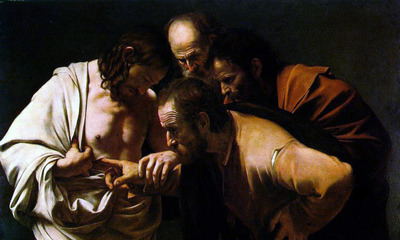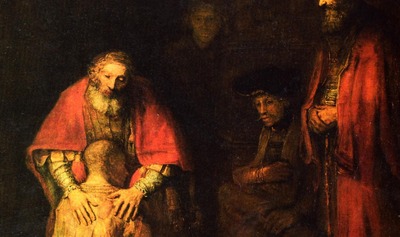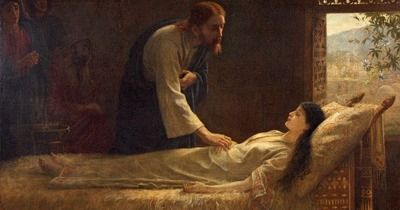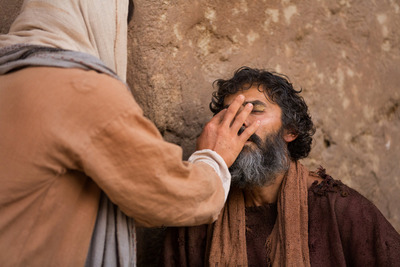April 27, 2025
|by N W
|
0 Comments
|
Discipleship, Father Nixon, Forgiveness, Healing, Mercy, Mission
Second Sunday of Easter
Sunday of Divine Mercy
April 27, 2025 — Year C
Readings: Acts 5:12-16 / Ps 118 / Rv 1:9-11a, 12-13, 17-19 / Jn 20:19-31
by Rev. Nixon Negparanon, Pastor
Today, on this Second Sunday of Easter, we celebrate Divine Mercy Sunday, a feast instituted by St. John Paul II in the year 2000, inspired by the revelations of Jesus to St. Faustina Kualska. At the heart of this Sunday is the message that God’s mercy is greater than any sin. And that we, as followers of Christ, are called not only to receive that mercy, but to live it, breathe it, and bring it into a wounded world.
The gospel today brings us back into the upper room, where the risen Christ appears to His fearful disciples, showing them His wounds and breathing His peace upon them. His first words are “Peace be with you,” and then He commissions them: “As the Father has sent me, so I send you.”
But then the focus turns to Thomas, who wasn’t there when Jesus first appeared. Thomas doubts, and yet Jesus does not rebuke him. He invites him: “Put your finger here… Do not be unbelieving but believe.” Jesus meets Thomas in his doubt, not with judgment but with mercy.
Our Church reminds that Christ’s resurrection is the crowning truth of our faith, and that, through it, we are not only reconciled with God, but also commissioned to be instruments of reconciliation and peace. The Church teaches that mercy is the very foundation of Christian life, not as a vague sentiment but as a mission. To forgive as we have been forgiven, and to heal as we have been healed. This is not just an idea; it is a mandate. And we have seen this more clearly in our time through Pope Francis.
In the early days of his pontificate, Pope Francis was asked in an interview, “Who is Jorge Mario Bergoglio?” His response was both humble and powerful: “I am a sinner whom the Lord has looked upon.” That simple phrase captures the essence of Divine Mercy. Pope Francis never spoke of mercy as an obstruction. He lived it deeply and personally.
God’s mercy is our liberation and our happiness. We live for mercy, and we cannot afford to be without mercy. It is the air we breathe. We are too poor to set any conditions. We need to forgive, because we need to be forgiven. If there is a message that has most characterized Pope Francis’s pontificate and is destined to remain, it is that of mercy.
When Pope Francis was archbishop of Buenos Aires, he used to sneak out at night to visit the slums, dressed in plain clothes, to meet the poor, the addicts, the forgotten. One night he came across a man who had lived on the streets for years. The man recognized him and said, “Father Bergoglio, you came back.” The then-cardinal sat with him in silence for over an hour. When asked later why he did that, he said, “Because sometimes mercy is not in the words. It is in the staying.”
He taught us that mercy is presence. Mercy is listening. Mercy is not earned; it is offered freely, as Jesus offered it to Thomas.
As Pope Francis said that the Church is a field hospital after battle. “Heal the wounds, heal the wounds… and you have to start from the ground up.” Brothers and sisters, like Thomas we all have wounds. We all doubt. But Jesus meets us with tenderness, not condemnation. He invites us to touch His wounds and find our healing there. Go to confession, not out of fear, but out of trust that mercy is real.
We live in a world marked by division, hatred, and loneliness. Our culture often says, cancel the sinner. But Jesus says, touch my wound.
Pope Francis reminds us that the Church is not a museum for saints but a hospital for sinners. Let us be people who forgive, who reconcile, who reach out. So many around us are like Thomas, wounded, doubting, waiting for someone to show up. We can be that someone in our homes, parishes, workplaces. Let us be that presence of peace and mercy.
In this digital, polarized, and fast-moving world, mercy can feel countercultural. Yet, it is the very thing our world longs for. In a time when wars rage, when refugees wander, when the poor are forgotten, and when many feel unseen, the message of Divine Mercy and the example of Pope Francis call us to step into the wounds of the world, not with judgment but with love.
Let us visit the sick, feed the hungry, call the lonely, forgive the unforgivable. Let us slow down, listen more, and judge less. Let us also remember that showing mercy begins at home, with our families, our parishes, and even ourselves.
As we reflect on Divine Mercy, let us offer our prayers on this homily as a tribute to Pope Francis, a man whose life has become a parable of mercy. He has taught us not only with encyclicals and exhortations, but with gestures: washing the feet of prisoners; embracing the disfigured; calling the young people to dream; and challenging all of us to build a Church that goes to the peripheries.
In a homily he gave during one of his morning Masses in April 2014, Pope Francis said, “How many of us perhaps deserve a condemnation? And it could be just. But He forgives. How? With mercy that does not erase the sin. It is only the forgiveness of God that erases it, while mercy goes beyond that. It is like the sky. We look at the sky. So many stars. But when the sun comes in the morning with so much light, the stars are no longer seen. So it is with God’s mercy. A great light of love, of tenderness, because God forgives not with a decree but with a caress.
May Pope Francis’s example stir within us the courage to love boldly, forgive radically, and serve joyfully. Dear brothers and sisters, let us not be unbelieving but believe. Let us not keep mercy to ourselves, but go forth, as the Father has sent Jesus, so He now sends us. And as Pope Francis once said, “Mercy is the very foundation of the Church’s life. All of our pastoral activity should be caught up in the tenderness He makes present to believers. Nothing in her preaching and in her witness to the world can be lacking in mercy.” May we become what we receive, instruments of mercy in a world so desperately in need.
KEEP READING
 540-586-8988
540-586-8988 










